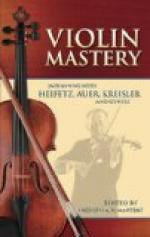I implied that what Mr. Heifetz said might shock thousands of aspiring young violinists for whom he pointed a moral: “Of course,” his answer was, “you must not take me too literally. Please do not think because I do not favor overdoing practicing that one can do without it. I’m quite frank to say I could not myself. But there is a happy medium. I suppose that when I play in public it looks easy, but before I ever came on the concert stage I worked very hard. And I do yet—but always putting the two things together, mental work and physical work. And when a certain point of effort is reached in practice, as in everything else, there must be relaxation.
THE DEVELOPMENT OF A VIRTUOSE TECHNIC
“Have I what is called a ‘natural’ technic? It is hard for me to say, perhaps so. But if such is the case I had to develop it, to assure it, to perfect it. If you start playing at three, as I did, with a little violin one-quarter of the regular size, I suppose violin playing becomes second nature in the course of time. I was able to find my way about in all seven positions within a year’s time, and could play the Kayser etudes; but that does not mean to say I was a virtuoso by any means.
“My first teacher? My first teacher was my father, a good violinist and concertmaster of the Vilna Symphony Orchestra. My first appearance in public took place in an overcrowded auditorium of the Imperial Music School in Vilna, Russia, when I was not quite five. I played the Fantaisie Pastorale with piano accompaniment. Later, at the age of six, I played the Mendelssohn concerto in Kovno to a full house. Stage-fright? No, I cannot say I have ever had it. Of course, something may happen to upset one before a concert, and one does not feel quite at ease when first stepping on the stage; but then I hope that is not stage-fright!
“At the Imperial Music School in Vilna, and before, I worked at all the things every violinist studies—I think that I played almost everything. I did not work too hard, but I worked hard enough. In Vilna my teacher was Malkin, a pupil of Professor Auer, and when I had graduated from the Vilna school I went to Auer. Did I go directly to his classes? Well, no, but I had only a very short time to wait before I joined the classes conducted by Auer personally.
PROFESSOR AUER AS A TEACHER
“Yes, he is a wonderful and an incomparable teacher; I do not believe there is one in the world who can possibly approach him. Do not ask me just how he does it, for I would not know how to tell you. But he is different with each pupil—perhaps that is one reason he is so great a teacher. I think I was with Professor Auer about six years, and I had both class lessons and private lessons of him, though toward the end my lessons were not so regular. I never played exercises or technical works of any kind for the Professor, but outside of the big things—the concertos and sonatas, and the shorter pieces which he would let me prepare—I often chose what I wanted.




